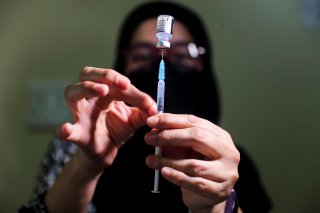Dr. Gottlieb: Vaccines That Target Specific Variants Have Limitations
On Monday, researchers in South Africa acknowledged that the variant might cause less serious disease compared to other forms of the virus.
The number of new cases of the highly mutated omicron coronavirus variant that was first detected in southern Africa two weeks ago continues to trend upward. This has prompted people to ask whether vaccines that can directly target specific variants could play a sizeable role in eventually containing further spread.
According to Dr. Scott Gottlieb, the former commissioner of the U.S. Food and Drug Administration (FDA), “there’s reason to believe” that variant-specific immunizations might not work well against other coronavirus variants.
“What we’ve seen in the past, for example, when we engineered a vaccine to specifically target 1351, the old South African variant, was that vaccine worked well or appeared to work well against 1351 but didn’t appear to provide as good coverage against all the other variants,” Gottlieb, a physician who worked at the FDA under former Presidents Donald Trump and George W. Bush and now serves on the board of COVID vaccine maker Pfizer, noted in an interview on CBS News on Sunday.
“And there’s reason to believe that as you develop vaccines that are very specific to some of these new variants, they may not work as well against the full complement of different variants that we’ve seen,” Gottlieb said. “So, you wanted to try to stick with the ancestral strain, the Wuhan strain, in the vaccine, I think, as long as possible.”
Scientists Working Overtime
Gottlieb’s comments come as scientists around the world are still collecting and analyzing data on the virus and the overall effectiveness of the currently available vaccines. The omicron variant is known to boast more than thirty mutations to the spike protein, which could be potentially associated with a decrease in antibody protection and higher transmissibility rates.
“We know it has many mutations, more mutations than prior variants,” Centers for Disease Control and Prevention Director Dr. Rochelle Walensky said on ABC News on Sunday.
“Many of those mutations have been associated with more transmissible variants, with evasion of some of our therapeutics, and potentially evasion of some of our immunity, and that’s what we’re watching really carefully,” Walensky added.
Early Data Positive
On Monday, researchers in South Africa acknowledged that the variant might cause less serious disease compared to other forms of the virus. It is unclear whether those early findings will hold true as more data come in.
“It would not be shocking if that’s true, but I’m not sure we can conclude that yet,” Dr. Emily S. Gurley, an epidemiologist at Johns Hopkins Bloomberg School of Public Health, told the New York Times.
The Omicron variant so far has been detected in at least fifteen U.S. states and thirty countries on six continents.
Ethen Kim Lieser is a Washington state-based Science and Tech Editor who has held posts at Google, The Korea Herald, Lincoln Journal Star, AsianWeek, and Arirang TV. Follow or contact him on LinkedIn.
Image: Reuters

